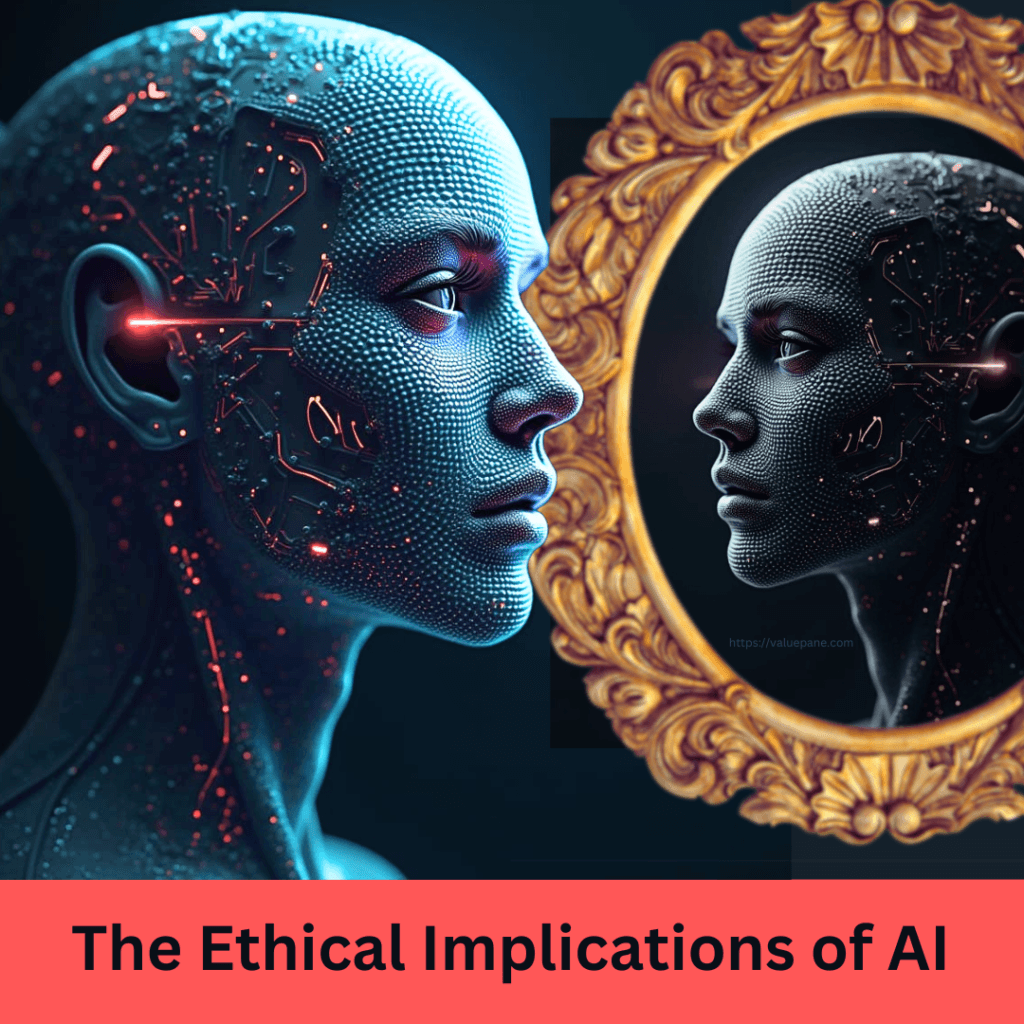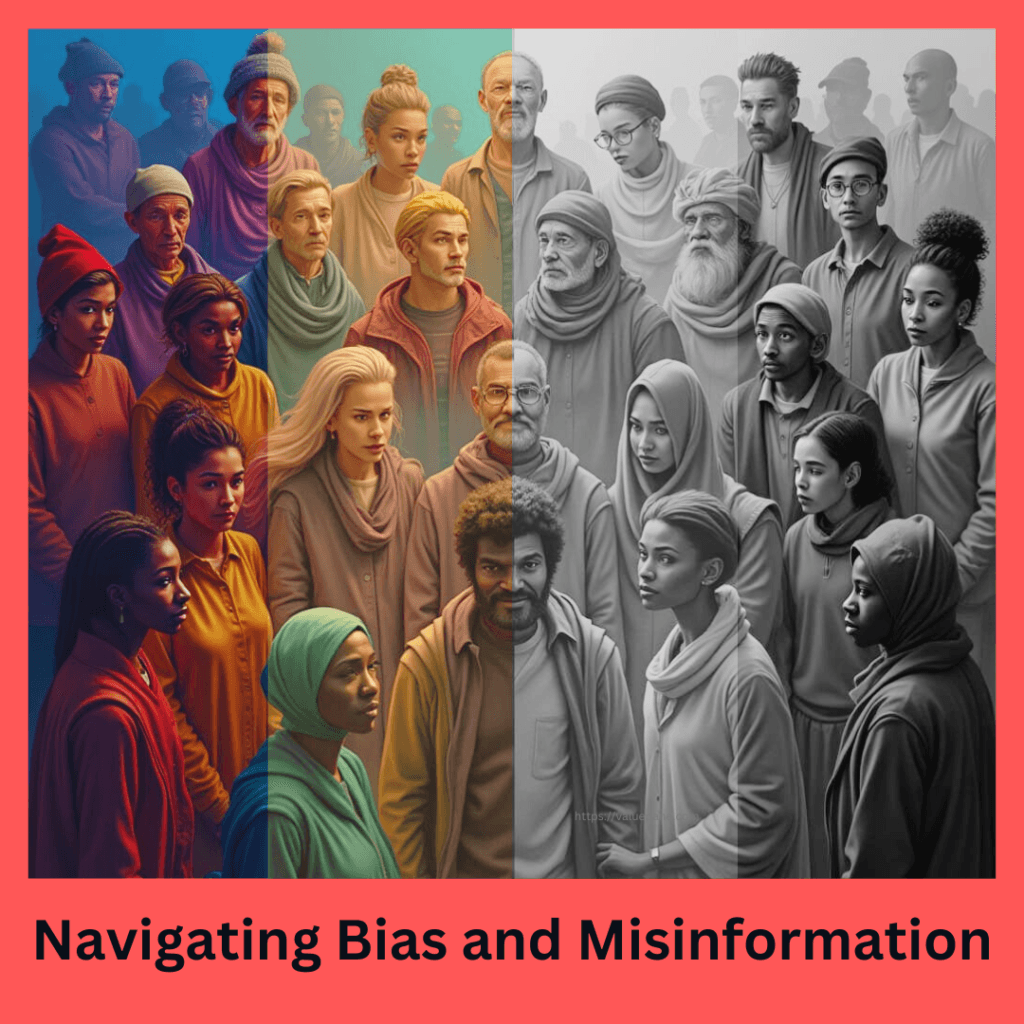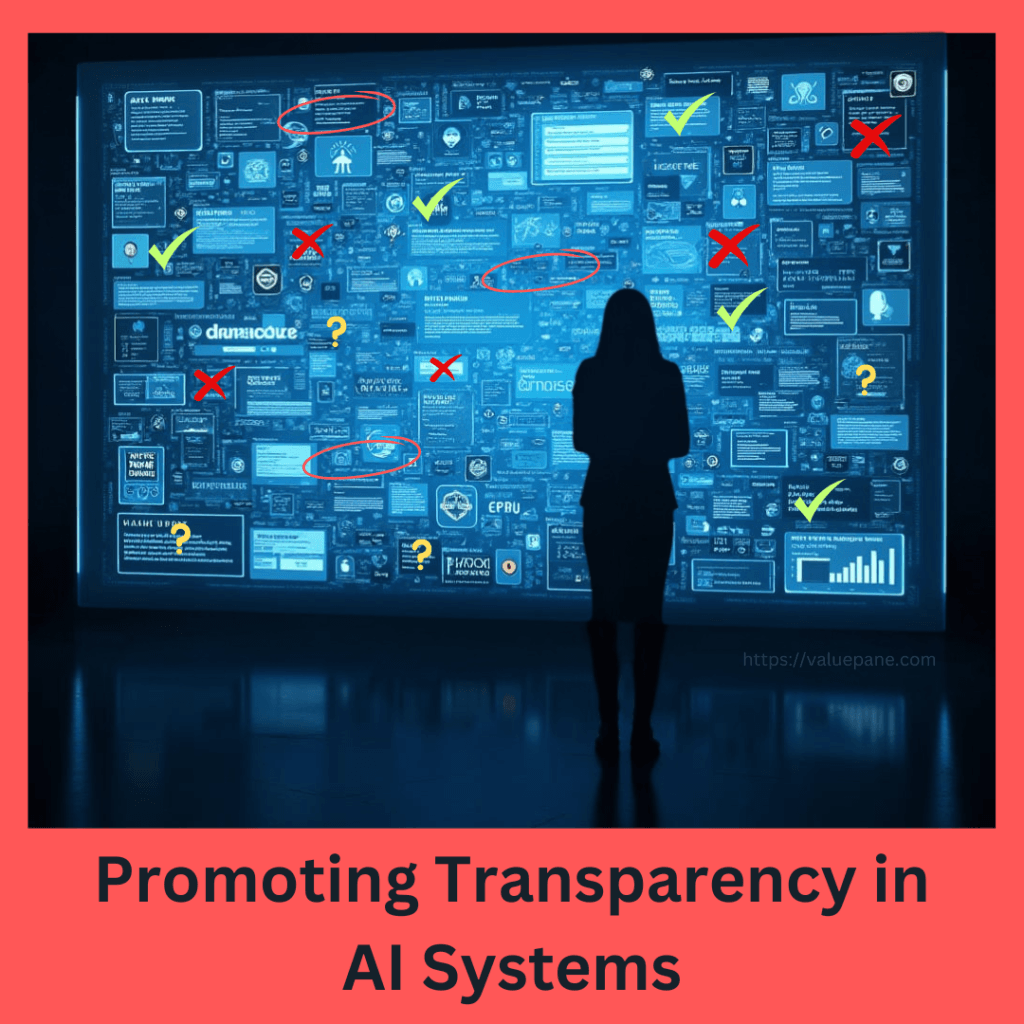Hello! Have you ever wondered about the amazing things that computers can do these days? It’s like something out of a science fiction movie! We call it Artificial Intelligence, or AI for short. AI is all about making computers smart, so they can learn, solve problems, and even make decisions like we do. It’s used in so many things, from video games to helping doctors diagnose diseases.
But as cool as AI is, we need to be careful. Just like any powerful tool, AI can be used for good or bad. One of the big things we have to think about is how AI can sometimes be biased or spread wrong information, which is what we’ll be diving into today.

Are you curious about how AI affects our lives and the ethics involved? AI is rapidly changing our world, but it brings with it potential problems like bias, misinformation, and threats to privacy. Many people are asking questions about the ethical implications of AI in various fields, from education and healthcare to finance and law enforcement.
These are important questions, and we need to find the answers. In this article we explore these issues, explaining how AI can be biased, spread fake news, and affect things like copyright and job security. Not only that, we have also delved into the potential solutions and ways we can use AI more responsibly.
Interested! Keep reading to understand how you can navigate this new AI world and make sure it’s a positive force for all of us!
Table of Contents
Understanding the Core Ethical Concerns
Let’s talk about some of the trickiest parts of AI
Algorithmic Bias
Imagine you’re teaching a computer to recognize cats. If you only show it pictures of white cats, it might think that only white cats are real cats! This is kind of what happens with AI. Algorithmic bias happens when AI systems are trained on information that isn’t fair or balanced. This can lead to some seriously unfair results.
For example, an AI program might treat one group of people differently from another group based on their race, gender, or even where they come from. It is important to keep in mind that AI systems can reinforce stereotypes and can exacerbate inequalities in our society. If we don’t make sure the information we use to teach AI is diverse and fair, we will see this bias show up in the AI’s results.
Lack of Transparency
Have you ever tried to figure out how your favourite video game works, only to find it’s super complicated? Well, some AI systems are like that too. They’re like a “black box” because it’s very difficult to know exactly how they make their decisions.
This lack of transparency makes it hard to figure out if the AI is doing something wrong and makes it difficult to hold anyone accountable when things go wrong. We need to make sure that we make AI that is easier for us to understand. It’s like having a clear instruction manual for a toy, so you know how it works!
Accountability and Responsibility
If a self-driving car makes a mistake, who is to blame? Is it the programmer who designed the car? Or is it the company that made it? These questions are really tricky to answer. When AI makes mistakes or causes harm, we need to figure out who is responsible. It is very important to establish clear guidelines for AI development and deployment so we can make AI that is more fair and more responsible.
Misinformation, Disinformation and Deepfakes
Imagine if someone used AI to create a video of you saying something you never actually said. That’s the kind of problem we face with AI! Misinformation is like when you hear a rumour and it isn’t true, and disinformation is when someone knowingly makes up a lie. AI can make it so easy to create fake news, fake videos called “deepfakes,” or just generally trick people. This is really dangerous because it makes it difficult to know what’s real and what’s not. It can hurt people’s health, wellbeing and safety, and it can mess up how we trust each other and the news.
Copyright and Intellectual Property Rights (IPR)
Let’s say AI creates a fantastic piece of music, who gets the credit? This is a really difficult question and it involves copyright and intellectual property rights. Copyright protects the things that people create, like music, art, and books. AI’s ability to create these kinds of things so easily makes it difficult to decide who owns that creation.
It is very important to protect IPR for AI models, and we must decide how concepts like “fair use” should apply to AI-generated content. It’s like trying to figure out who gets the prize when two teams work together on a project, there is a need to balance the rights of human creators with the public interest.
Download Resource
Download, Two of the 3 Part Report on Copyright and Artificial Intelligence published by the Copyright Office (United States) that has been examining the copyright law and policy (US Gov) issues raised by artificial intelligence (AI).
Part 1 on Digital Replicas
Part 2 on Copyrightability

Ethical Implications in Specific Sectors
Now, let’s see how these ethical challenges show up in different parts of our lives:
AI in Journalism
AI can help journalists gather information, write articles, and even personalize news for readers. However, if we are not careful, there is a danger that AI can introduce biases into the news and can amplify wrong information. AI can make it easier to produce articles quickly, but this can make it difficult for humans to check the news, resulting in less accuracy. Because of all of this, there is a need to maintain accuracy, fairness, and integrity when using AI in the news.
AI in Healthcare
AI can be incredibly helpful in healthcare. It can help doctors diagnose diseases, find new medicines, and even help manage hospitals. However, it is very important to protect patient privacy and data security, and we have to make sure that AI tools are fair and not biased. We must figure out who should be responsible when an AI makes a mistake.
AI in Education
AI can make learning more personalized and fun for you. It can offer homework help and provide new ways to learn. But if we rely too much on AI, will it make it difficult for us to think for ourselves? Will we start using AI to cheat? How can we make sure that AI doesn’t replace teachers and that students don’t stop developing their critical thinking and problem-solving skills?
AI in education offers personalized learning but also raises concerns about data privacy and potential bias in algorithms. To learn more about the benefits and use AI in education, see our post on AI in Education.
AI in Public Relations
AI is now used to help in advertising and communications, but it has a potential for problems. For example, AI systems can communicate in ways that are not fair or that discriminate. We have to make sure that we use AI in ways that promote diversity and fairness.
AI in Media and Entertainment
The media and entertainment industry is experiencing a significant transformation due to AI, with use cases in music, film, gaming, advertising, and content creation. AI tools are now capable of generating music, analyzing scripts to predict commercial success, creating 3D animations, and personalizing content recommendations.
While these advancements offer increased efficiency and creative possibilities, they also raise concerns about the originality and ownership of AI-generated content, the potential displacement of human creators, and the ethical implications of using AI to produce deepfakes and manipulated media.
There is a need for transparency and regulation to ensure that the integration of AI in this industry is responsible and does not undermine the value of human creativity.
AI’s use in targeted advertising and content distribution raises concerns about data privacy and the potential for algorithmic bias in content recommendations.
AI in Digital Marketing
AI is revolutionizing digital marketing by providing tools for precise audience targeting, personalized marketing campaigns, and automated content generation. AI algorithms analyze vast amounts of consumer data to create more effective marketing strategies. But, the extensive use of AI in marketing raises ethical concerns about data privacy, the potential for manipulation, and the need for transparency in how data is collected and used.
The increasing sophistication of AI-powered marketing also raises questions about consumer autonomy and the potential for algorithmic bias in ad targeting. It is crucial for companies to prioritize ethical data practices and consider the long-term impact of AI on consumer trust and brand reputation. Companies must disclose to consumers what kind of data will be acquired from them to maintain ethical standards and trust.
AI in Legal
The legal field is beginning to see the integration of AI for tasks like legal research, document review, and case analysis. AI is being used to automate regulatory document analysis. AI systems can process large volumes of legal data quickly, increasing efficiency in the legal process.
The application of AI in law does raise concerns about bias in algorithms, the impact on access to justice, and the need to ensure human oversight in legal decision-making.
The potential for AI to perpetuate existing societal biases and the ethical implications of AI-driven tools in law enforcement are significant issues that need to be addressed to maintain fairness and equity. There is a need for AI governance to include aspects of anticipation and effective protection to safeguard human rights and freedoms.
Everyday Life
Since AI is increasingly pushing its way into the above industries, we can say without doubt that AI has integrated into our daily lives, often in ways we may not even realize.
From AI-powered assistants, to personalized recommendations on streaming platforms, and the use of AI in robotics for smart homes, AI is changing how we interact with our environment and with technology.
These advancements raise concerns about data privacy, algorithmic bias, and the potential for over-reliance on AI systems. Additionally, the impact of AI on mental health, well-being, and human relationships requires careful evaluation.
It is essential to promote public awareness and digital literacy to ensure that individuals are able to make informed decisions about their use of AI systems and are protected from undue influence. As AI becomes more pervasive, we must critically consider its implications for our autonomy, agency, and well-being.

Video Resource
Here is a video from Visual Venture that highlights Disturbing Crimes Committed using AI
Download Resource
Download and Read this report from Google Threat Intelligence Group (GTIG) about the Adversarial Misuse of Generative AI
Proposed Solutions and Approaches
So, what can we do to make sure AI is used for good?
Here are some ideas:
Developing Ethical Guidelines and Principles
We need to make clear rules for how AI should be made and used. These guidelines should include the ideas of fairness, transparency, accountability, privacy, and human rights. It is important to have people from all different backgrounds helping to create these guidelines.
AI systems must be developed and deployed responsibly, considering their potential impact on human lives. Discover how AI is evolving from creative tool to powerful technology in our post about AI tech.
Promoting Transparency in AI Systems
We have to make AI systems easier to understand, so people can see how they work. This means we need to create AI algorithms that we can look into to make sure they are doing the right thing. We need to be able to see how AI comes up with a decision.
Bias Detection and Mitigation
We have to teach AI using diverse and fair information. We also need to come up with ways to find and fix biases that are already in AI. We should regularly check AI to make sure it is working fairly.
Human-AI Collaboration
AI isn’t meant to replace humans. It is a powerful tool that can help us. We need to come up with ways for humans and AI to work together. People need to be in charge of making sure AI is used ethically and safely. It is important to combine the strengths of humans with the power of AI.
AI automation is transforming the workplace; we must ensure fair labor practices and opportunities. Learn more about how AI is changing the future of work in our discussion of industry disruption.
Content Moderation and Regulation
We need rules about how AI can be used to create content, especially misinformation. We also need ways to check if something is real or fake. AI can be used to help with fact-checking and make sure content is labelled correctly.
Can AI truly be creative, or are we simply automating content? For more insights into how AI can improve your content creation, see our post on AI writing.
Information Literacy
We need to teach ourselves and others how to spot fake news and misinformation . This means we need to be able to think critically about the things we read and see online . We must be able to discern real from fake news, and information from disinformation.
Frameworks and Tools
There are already a lot of groups and tools focused on how to use AI ethically. Groups like the AI Now Institute and the Berkman Klein Center are working to promote better and responsible AI.
There are also frameworks like the NIST AI Risk Management Framework that can help in developing ethical AI. Tools like Nvidia NeMo Guardrails can make sure AI behaves responsibly. These tools can help protect against the misuse of AI.
Future Directions and Emerging Issues
There’s still so much we have to figure out about AI. Here are some things we should consider:
Further Research
We need to keep studying AI to learn more about its ethical implications. We have to stay up to date on all the new ways AI is being developed.
Long-term Ethical Considerations
What will our society look like when AI is everywhere? We have to think about how AI will change how we interact with each other and the world. We need to think about things like job displacement and economic inequality and make sure everyone benefits from AI. We have to figure out how AI will impact human dignity and autonomy.
Regulatory Frameworks
Governments around the world are working to develop rules for AI. These rules should help promote innovation but they must also protect us from harm. This will mean making sure that AI is aligned with human values.
Conclusion
AI is an amazing technology, and it has the potential to make our world a better place. But to do that, we have to make sure it’s fair, transparent, and responsible. AI ethics is crucial because AI systems can have significant consequences, potentially reinforcing biases, compromising privacy, and spreading misinformation if not developed and used responsibly.
We must understand that bias in AI refers to systematic errors or prejudices in AI systems that can lead to unfair, discriminatory, or inaccurate outcomes. This bias often arises from the data used to train AI models.
Let us learn to use AI as a tool to augment, not replace human judgment, and involve humans in the final decision-making processes.
We must all work together to make sure AI benefits society and does not cause harm. So let’s be curious and learn about the many opportunities and challenges AI presents! Together, we can make AI work for everyone.
